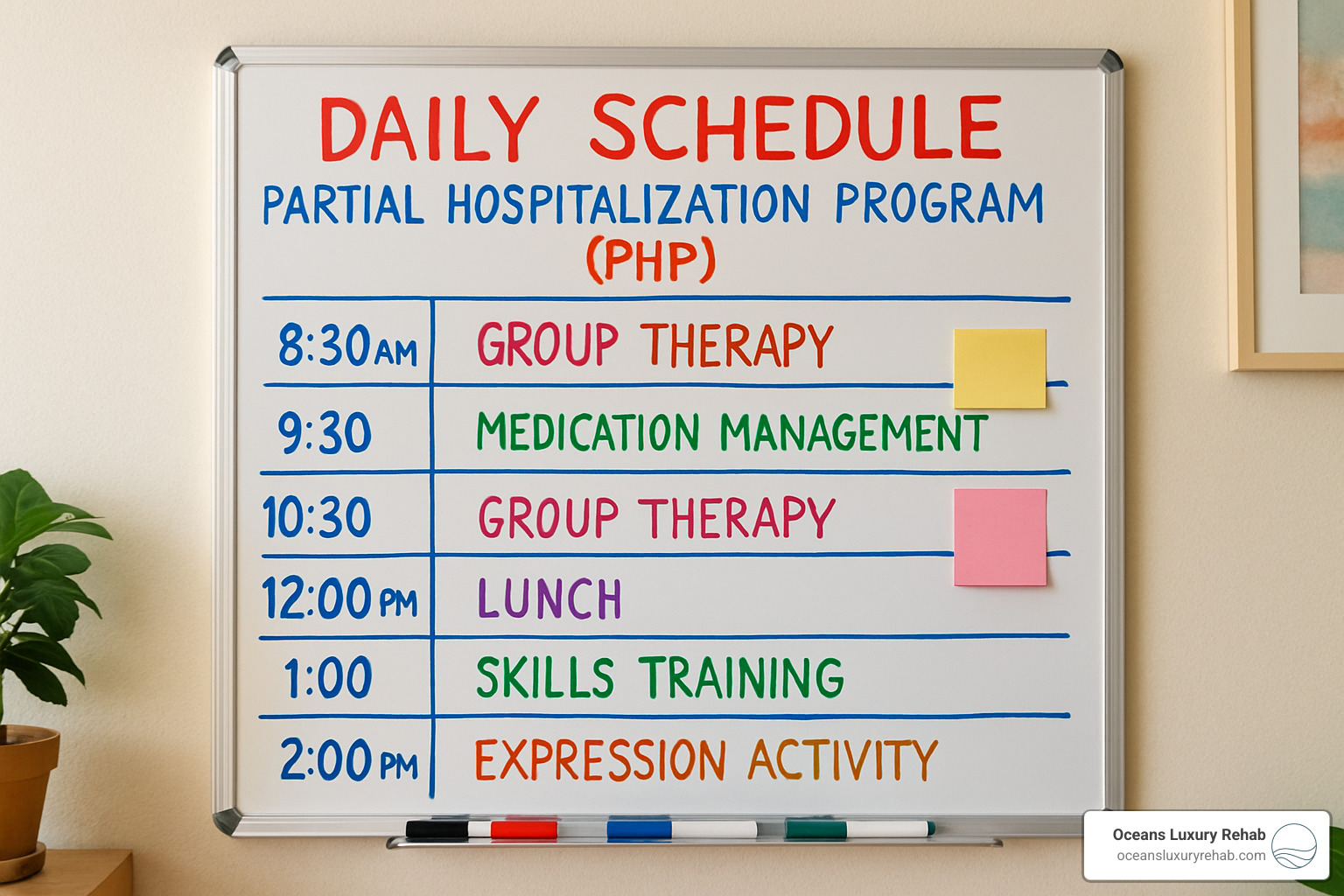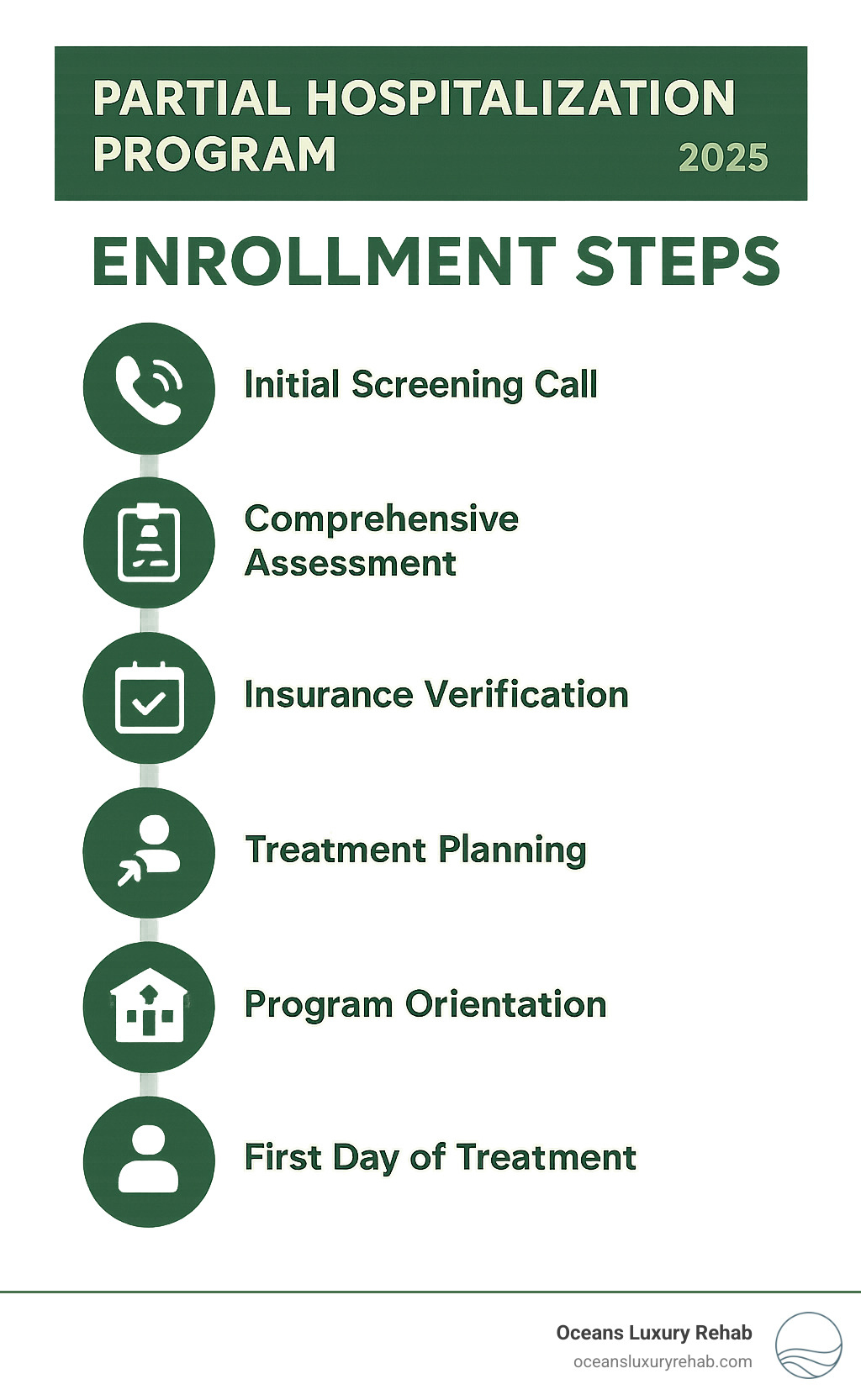Why Partial Hospitalization Programs Are Changing Mental Health Care
A partial hospitalization program (PHP) is a structured outpatient treatment that provides intensive mental health or addiction care during the day while allowing patients to return home each evening.
Key Features:
- Minimum 20 hours of therapeutic services per week
- 5-6 hours per day, typically 4-5 days weekly
- Multidisciplinary team including psychiatrists, therapists, and social workers
- Step-down care from inpatient treatment or alternative to hospitalization
- Medicare and insurance coverage available for qualifying patients
Nearly 45% of behavioral healthcare facilities now offer psychiatric partial hospitalization programs, making this level of care increasingly accessible for people who need intensive treatment but want to maintain their daily routines and family connections.
PHP offers a midpoint between inpatient and outpatient services. For professionals struggling with substance abuse or mental health challenges, PHP provides comprehensive treatment while keeping career responsibilities intact.
I’m Clint Kreider, and I’ve spent over 13 years helping clients steer their recovery journey, including guiding many through partial hospitalization program experiences. My background in clinical psychology and addiction treatment has shown me how effective PHP can be for motivated individuals ready to make meaningful changes.

Simple guide to partial hospitalization program terms:
- does your insurance cover a partial hospitalization program
- how long are partial hospitalization programs
- alcohol rehab orange county (★)
Understanding Partial Hospitalization Programs (PHP)
A partial hospitalization program bridges the gap between full hospitalization and regular outpatient therapy. You get intensive care during the day, then return home to your family each evening.
PHP originated in the 1930s but modern approaches developed in the 1950s when Dr. Albert E. Moll recognized that people recover faster when they stay connected to their community while receiving intensive treatment.
Today’s partial hospitalization programs meet strict Medicare standards, providing at least 20 hours of therapeutic services per week. This intensity level creates real, lasting change while keeping you out of the hospital.
The multidisciplinary team approach means you work with psychiatrists, licensed therapists, social workers, and occupational therapists – all coordinating your care. Scientific research on PHP effectiveness shows patients and families report much higher satisfaction one year after PHP discharge compared to traditional inpatient treatment.
What Sets a Partial Hospitalization Program Apart?
Inpatient care means 24/7 hospital stays with round-the-clock supervision but complete removal from normal life. Partial hospitalization programs provide intensive treatment 5-6 hours daily while you go home each evening. Intensive outpatient programs (IOP) offer 3-4 hours per day with more flexibility.
| Treatment Level | Hours per Week | Days per Week | Medical Supervision | Duration |
|---|---|---|---|---|
| Inpatient | 24/7 | 7 | Continuous | 3-7 days |
| PHP | 20-30 | 4-5 | During program hours | 2-4 weeks |
| IOP | 9-15 | 3-4 | Limited | 6-12 weeks |
PHP’s effectiveness comes from “patient-environment contact” – staying connected to real life while learning coping skills. You’re not practicing recovery in isolation but dealing with actual family dynamics, work stress, and daily challenges.
More info about PHP mental health treatment explains how these programs address specific mental health conditions alongside addiction treatment.
Who Qualifies for a Partial Hospitalization Program?
The ideal PHP participant needs intensive help but has enough stability to manage outpatient care safely.
You might be a good fit if you’re stepping down from inpatient care, experiencing acute mental health symptoms but want to avoid hospitalization, dealing with both mental health and substance use issues, or needing intensive treatment while managing responsibilities.
Conditions commonly treated include depression and bipolar disorder, anxiety disorders and PTSD, substance use disorders, eating disorders, schizophrenia, personality disorders, and co-occurring conditions.
PHP isn’t right for everyone. If you’re experiencing severe psychosis, actively manic, or having thoughts of self-harm, you’ll need inpatient supervision first.
The referral process typically requires a physician referral, initial screening assessment, medical evaluation, insurance verification, and treatment planning. Safety evaluation includes suicide risk assessment, substance use patterns, and available support systems.
More info about adult partial hospitalization program options explains how programs are custom for different life stages.
Getting the Most From a PHP: Services, Outcomes & How to Enroll
The effectiveness of a partial hospitalization program comes from combining evidence-based therapies, skilled professionals, and your commitment to change.
Evidence-Based Treatment Approaches
Cognitive Behavioral Therapy (CBT) helps identify negative thought patterns that fuel depression, anxiety, and addictive behaviors. Dialectical Behavior Therapy (DBT) focuses on emotional regulation skills. Trauma-informed care addresses how past experiences affect current behaviors.
Medication Management includes frequent monitoring with real-time adjustments based on your response. Family involvement improves treatment outcomes through therapy sessions and communication training.
Modern programs use a recovery-oriented approach focusing on building meaningful, fulfilling lives rather than just treating symptoms. Unlike residential programs, PHP lets you practice new skills in real-world settings with intensive support available.
Scientific research on day-hospital cost effectiveness shows PHP provides equal or superior outcomes to inpatient care at a fraction of the cost.
Therapies, Schedule & Expected Length

A typical partial hospitalization program runs 8:30 AM to 3:00 PM, Monday through Friday. Group sessions are limited to 15 participants, focusing on relapse prevention, coping strategies, addiction education, and mental health management.
Individual therapy provides weekly one-on-one sessions addressing personal trauma and recovery planning. Skill-building sessions cover emotional regulation, stress management, communication skills, and mindfulness practices.
Many programs incorporate creative therapies including art, music, and movement therapy – evidence-based treatments that help process emotions difficult to express verbally.
Most programs last 2-4 weeks, individualized based on symptom severity, treatment response, support systems, and insurance coverage.
More info about how long are partial hospitalization programs explains factors influencing program duration.
Costs, Insurance Coverage, and Proven Value
Medicare Part B covers partial hospitalization services when provided by certified programs with physician certification and at least 20 hours weekly of therapeutic services.
Medicaid coverage varies by state, with many covering up to 21 days without prior authorization. Private insurance usually covers PHP with inpatient-level benefits.
Research shows PHP achieves similar outcomes to inpatient care at 40-60% of the cost. Families report greater satisfaction one year after PHP discharge compared to inpatient treatment due to maintained connections and gradual transition to independence.
More info about insurance cover partial hospitalization program provides detailed coverage guidance.
Admission Steps & Life After Discharge

Starting a partial hospitalization program begins with a phone screening, followed by comprehensive assessment covering psychiatric history, medication review, and risk assessment. We develop an individualized treatment plan and provide program orientation.
Discharge planning begins day one and includes transition to outpatient therapy, medication management, support group connections, and relapse prevention strategies. We help build community support networks through 12-step meetings, peer support, and recreational activities.
Family involvement continues through ongoing therapy, education, and communication training. Recovery isn’t linear – we teach recognition of warning signs and quick access to support systems.
At Oceans Luxury Rehab, our Orange County PHP combines evidence-based treatment with luxury comfort, featuring individualized planning, comprehensive family support, seamless care coordination, and specialized medical oversight.
More info about partial hospitalization program at Oceans Luxury Rehab explains our specific approach.

If you’re considering a partial hospitalization program, seeking help demonstrates strength. PHP offers intensive treatment while maintaining important connections and responsibilities. Whether stepping down from inpatient care or seeking hospitalization alternatives, PHP provides the support needed for lasting recovery without putting your life on hold.
